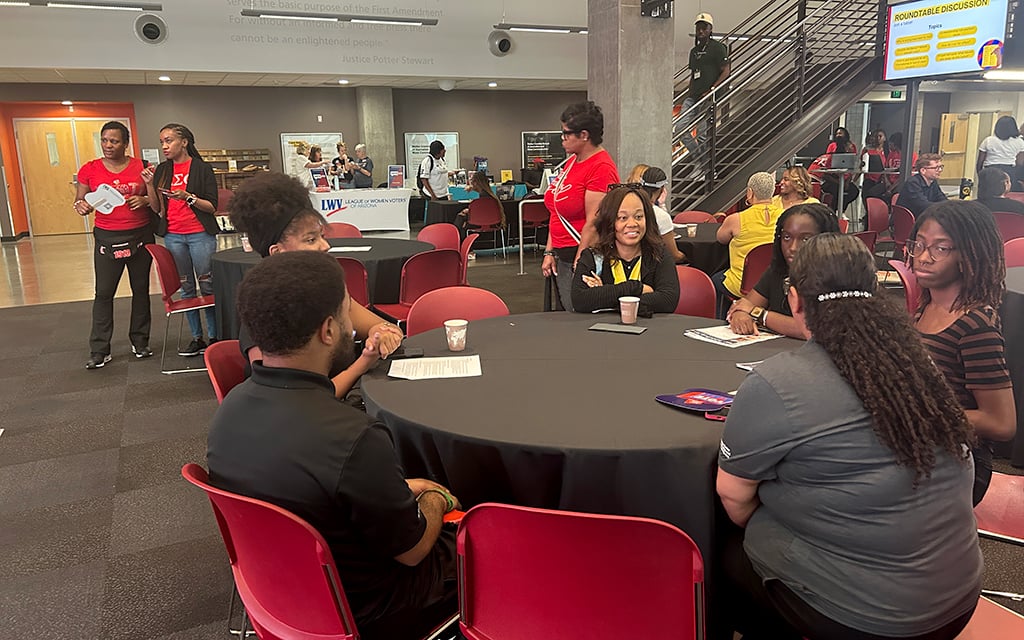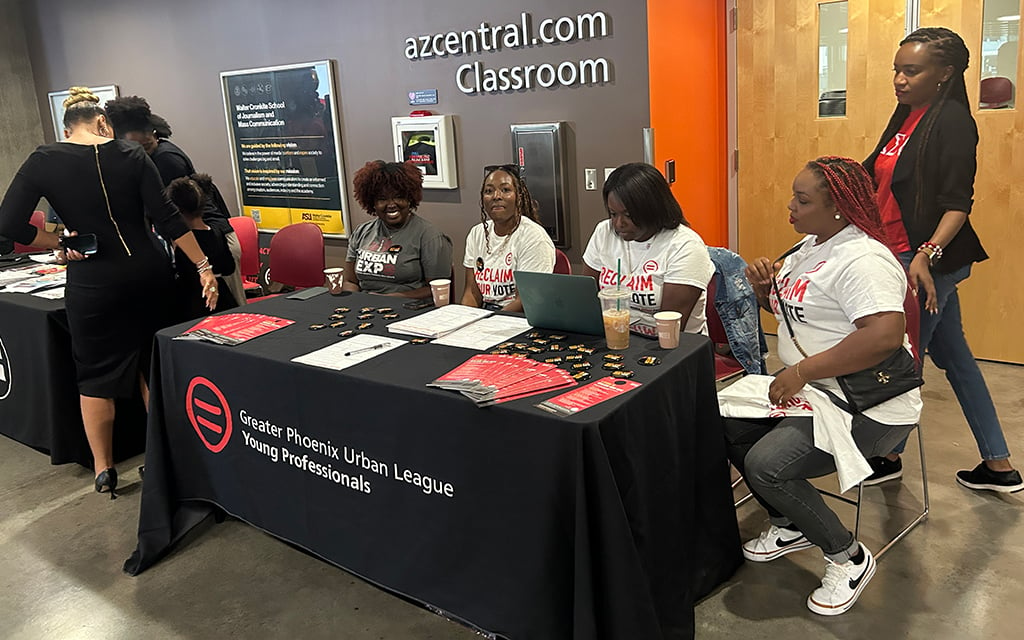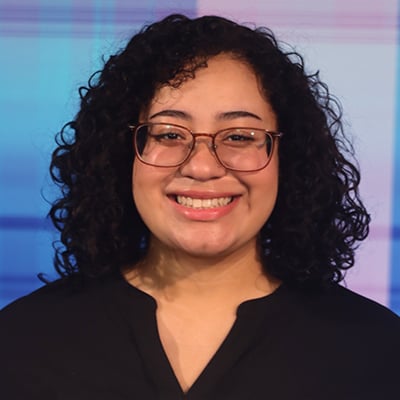
Attendees of the Youth Voter Forum at Arizona State University’s Walter Cronkite School of Journalism and Mass Communication discussed how international students could get involved and how to run for office on Sept. 15, 2024. (Photo by Hayden Larkin/Cronkite News)

Greater Phoenix Urban League Young Professionals were among the groups that urged college-aged voters to stay engaged and informed at the Youth Voter Forum at ASU’s downtown Phoenix campus on Sept. 15, 2024. (Photo by Hayden Larkin/Cronkite News)
PHOENIX – With the 2024 election around the corner, droves of people are being pushed toward the polls this November. But for many young voters, it has become difficult to remain engaged. Delta Sigma Theta Sorority Inc. Tempe Alumnae Chapter urged college-aged voters to stay engaged and informed at its Youth Voter Forum on Sunday.
“I just encourage everyone to vote,” said Keisha Tatem, Alumnae Chapter president. “I vote because there were people at one point in time that could not vote, and some people lost their life to make sure everyone in America had the right to vote. And so I vote to honor them, but also because I want to be in control. I want to have some control over my future, and so it’s important to know that that’s what voting can give you.”
Helping with the forum was the sorority’s sister Iota Kappa chapter at Arizona State University as well as the Greater Phoenix Urban League Young Professionals, ASU Black Student Union, League of Women Voters of Arizona and the National Association of Black Journalists at ASU. It also featured a panel with Walter Cronkite School of Journalism and Mass Communication Dean Dr. Battinto L. Batts Jr. and professors Retha Hill and Pauline Arrillaga. Cronkite News is a program at the Cronkite School, where the event was held.
The panelists discussed the importance of media literacy and the ongoing battle with misinformation and democracy. Deepfakes, generative artificial intelligence and social media were discussed, highlighting the importance of credible information and working to make sure democracy is protected through an informed electorate.
“We get a lot of our information on social (media), and we’ve got to break out of that bubble. We tend to go toward information that pleases us, that confirms our own opinions or perspectives. And we have to go beyond that. We have to get out of that echo chamber,” Batts said. “We have to engage in conversations and get to know people, get to know our neighbors, get to know other people in our communities.”
Other panelists agreed with this assessment when discussing AI. “With generative AI, in just a matter of minutes, you can create a video, you can create an image, you can create a fake voice, you can create so many things and get it out there,” Hill said. “And as much as mainstream media and other sources try to back down some of this misinformation and disinformation, it can be recreated and spread.”
Facilitators also spent time educating young voters about how to get started within the electoral process and the importance of staying engaged with democracy. They held roundtables about how to get involved as an international student or how to run for office. The League of Women Voters of Arizona handed out pamphlets explaining November’s ballot initiatives to new voters.
In the 2020 election, Americans under the age of 30 made up 38% of new or irregular voters, according to a study by the Harvard Political Review. Another study by the Brookings Institution also found that there will be 8.3 million newly eligible voters this election, meaning that young voters are making up a large part of the electorate.
“From the legal and voters’ perspective, in order to have a healthy democracy, everybody needs to participate. And it’s critical that our youth get engaged and remain engaged. They’re actually a larger voting bloc than the next-largest voting bloc, which is boomers,” said Kara Pelletier of the League of Women Voters of Arizona. “That particular age group, 18 to 29, really is a huge section of the electorate, and they could really have a lot of influence and say in what goes on in our country, our politicians, what our budgets are focused on, who’s elected.”
With a younger, more diverse, more progressive and more online group of voters, politicians are vying for their attention. Delta Sigma Theta Sorority Inc. is trying to show the power this bloc has on politics in targeting the crowd under 30.
“They should be engaged if they feel that the world, that our current political system, is not giving them what they want … just the sheer numbers alone, they can influence how things happen,” Tatem said. “I encourage them to understand the power of their number, the power of if they can come together collectively, and maybe those of us that are a little bit older, we can help guide them, but they really need to take charge of it themselves.”


